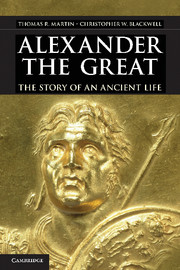Book contents
- Frontmatter
- Contents
- Acknowledgments
- Introduction: The Goal of this Book
- Map 1: European Greece, Macedonia, and Northern Lands
- Map 2: Alexander's Expedition
- 1 The World of Alexander's Birth and His Education in Literature and Warfare (350s and 340s BC)
- 2 Opportunities and Risks asa Teenager (340s to 338 BC)
- 3 The Danger in Replacing a Murdered Father as King (337 to 335 BC)
- 4 The Opening Battles Against the Persian Army (334 to 332 BC)
- 5 Finding God in Egypt and Capturing the Riches of Persia (332 to 330 BC)
- 6 Winning the World as King of Asia (330 to 329 BC)
- 7 Murder, Marriage, and Mixing Customs in Afghanistan (329 to 327 BC)
- 8 Victory and Frustration in India (327 to 326 BC)
- 9 Returning to Babylon and Becoming Divine (326 to 323 BC)
- 10 Remembering and Judging Alexander (323 BC to Now)
- Suggested Readings
- Index
10 - Remembering and Judging Alexander (323 BC to Now)
Published online by Cambridge University Press: 05 November 2012
- Frontmatter
- Contents
- Acknowledgments
- Introduction: The Goal of this Book
- Map 1: European Greece, Macedonia, and Northern Lands
- Map 2: Alexander's Expedition
- 1 The World of Alexander's Birth and His Education in Literature and Warfare (350s and 340s BC)
- 2 Opportunities and Risks asa Teenager (340s to 338 BC)
- 3 The Danger in Replacing a Murdered Father as King (337 to 335 BC)
- 4 The Opening Battles Against the Persian Army (334 to 332 BC)
- 5 Finding God in Egypt and Capturing the Riches of Persia (332 to 330 BC)
- 6 Winning the World as King of Asia (330 to 329 BC)
- 7 Murder, Marriage, and Mixing Customs in Afghanistan (329 to 327 BC)
- 8 Victory and Frustration in India (327 to 326 BC)
- 9 Returning to Babylon and Becoming Divine (326 to 323 BC)
- 10 Remembering and Judging Alexander (323 BC to Now)
- Suggested Readings
- Index
Summary
No one met Alexander's ideal; none of his companions, events showed, measured up to the standard of being kratistos. When Alexander died, he left detailed plans for grand schemes that would unify his empire and expand it, a mixed realm ruled by Macedonians, Greeks, and capable men of any nation loyal to his vision. The plans included a thousand warships, larger than any ever seen, for a naval expedition to North Africa, Sicily, and Spain; they described a road, equipped with ports and shipyards, stretching from Egypt to the Pillars of Heracles, where the Mediterranean met the Atlantic; six great temples would be erected in Greece and Macedonia; finally – the culmination of a vision of a mixed culture redefining power in the world – his plans called for new cities as homes for populations transferred from Asia to Europe and from Europe to Asia. As Diodorus reports, Alexander intended through intermarriages and homesteads, “to put the greatest continents into a partnership of harmony and love based on family ties.” Perdiccas presented all of these plans to the assembled army. The soldiers agreed with his judgment that they were too difficult and too expensive. Not a single one was carried out. The generals all proclaimed their support for Alexander's family, pledging to support his impaired brother, who would share the kingship with the child soon to be born to Alexander's pregnant wife, if the baby was male. Behind these empty words they were all frantically crafting their own schemes and promoting their own narrow interests.
- Type
- Chapter
- Information
- Alexander the GreatThe Story of an Ancient Life, pp. 167 - 184Publisher: Cambridge University PressPrint publication year: 2012



